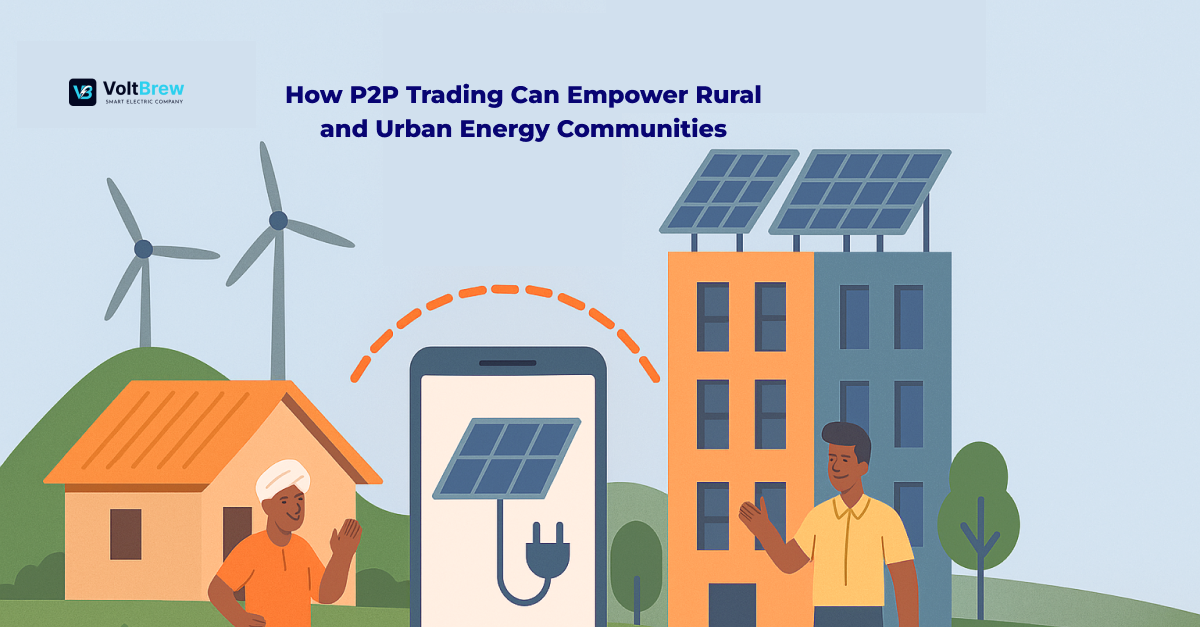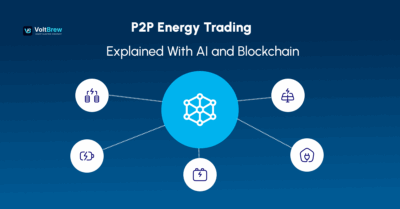India’s energy future is no longer confined to power plants and long transmission lines. It’s unfolding on rooftops, in neighborhoods, and across villages — powered by the sun and connected through technology.
Welcome to the age of Peer-to-Peer (P2P) energy trading, where everyday citizens are becoming energy producers, sellers, and community enablers. Whether in rural farmlands or urban housing societies, this model is changing how we generate, share, and benefit from electricity.
What Is P2P Energy Trading, Really?
Peer-to-peer energy trading allows individuals with solar panels (prosumers) to sell their surplus electricity directly to other users (consumers) within their local grid or community.
Instead of exporting excess solar power to the grid at low rates, prosumers can now:
- Set their own price
- Choose their buyers
- Earn more than net metering
- Support their neighbors with cheaper, greener energy
Through platforms like VoltBrew, this is becoming a real, scalable alternative to traditional power supply.
In Urban Communities: Smarter, Cleaner Neighborhoods
Urban India is experiencing a rapid rise in rooftop solar adoption — from gated communities and apartments to independent homes. But with peak consumption happening at night, many households export unused solar during the day at low tariffs.
With VoltBrew’s P2P platform, that unused power becomes a local asset. Neighbors can buy it at a better price than the DISCOM rate, and sellers get better returns than net metering.
Impact in urban areas:
- Reduced grid dependency and power bills
- Better solar ROI for homeowners
- Energy sharing within RWAs or co-op buildings
- Transparent billing through smart meters
Imagine a colony where buildings trade energy between floors — not as a futuristic concept, but a daily practice.
In Rural India: Energy Access and Economic Inclusion
In rural India, where grid reliability is inconsistent and access to clean energy remains a challenge, P2P trading has revolutionary potential.
Farmers or rural households with solar setups can sell unused electricity to nearby homes, businesses, or even cold storage units — creating micro-energy economies.
Benefits for rural communities:
- Local jobs through solar installation and meter servicing
- Income opportunities for small solar owners
- Reduced diesel dependence for pumps and generators
- Improved access to reliable power for underserved households
Over time, these villages could reduce dependence on distant power plants by building localized power plants alternatives that are cleaner and community-owned.
How VoltBrew Makes This Possible
VoltBrew is India’s first fully compliant P2P energy trading platform, designed to bridge the gap between solar producers and energy users. Here’s what sets us apart:
- Smart Meter Integration – Real-time tracking of energy flow
- Transparent Pricing & Billing – No confusion, just clean trades
- Regulatory Alignment – Working closely with DISCOMs & state regulators
- User-friendly Dashboard – Track savings, trades & earnings easily
Whether in a small town in Uttar Pradesh or an apartment in Pune, VoltBrew empowers users to take charge of their energy story.
Why It Matters: The Bigger Picture
P2P trading is more than a utility solution — it’s a movement toward energy democracy. It allows communities to:
- Decentralize power generation
- Democratize access to clean energy
- Strengthen local resilience
- Cut carbon emissions
And most importantly, it puts people — not just power plants — at the center of India’s energy transition.
Ready to Join the Energy Movement?
If you have rooftop solar or want to buy clean power from your community, VoltBrew is your trusted platform. Together, we can power homes, villages, and cities — one local trade at a time.
Because the future of energy isn’t just clean — it’s collaborative.
VoltBrew – Powering People, Not Just the Grid.



